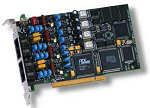 Ace Systems, a Georgia-based reseller of refurbished voice cards and other PC-based telephony products, agreed to a fine of $36,000 to settle these charges as set forth in the Bureau of Industry and Security’s Charging Letter:
Ace Systems, a Georgia-based reseller of refurbished voice cards and other PC-based telephony products, agreed to a fine of $36,000 to settle these charges as set forth in the Bureau of Industry and Security’s Charging Letter:
On or about July 3, 2006, Ace attempted a violation of the Regulations by attempting to export dialogic [sic] voice cards to Mayrow General Trading (“Mayrowâ€) in Dubai, United Arab Emirates,
without the Department of Commerce license required by General Order No. 3 of Supplement No. 1 to Part 736 of the Regulations. Dialogic voice cards are items subject to the Regulations and are designated as EAR99 items. Ace tendered ten dialogic [sic] voice cards items to its freight forwarder with instructions to export such items to Mayrow. The export did not reach Mayrow because the U.S. Government ordered its return pursuant to the Regulations. In so doing, Ace committed one violation of Section 764.2(c) of the Regulations.
It seems reasonable to suppose that Ace Systems was more than a little surprised when this charging letter showed up in its mailbox. The Dialogic voice cards were, after all, EAR99, and weren’t headed for a country subject to sanctions. Like many other exporters, Ace Systems had probably never heard of General Order No. 3.
There is, of course, no question here that Ace Systems attempted to violate the law and that, technically, more than a $36,000 fine could have been imposed. But is only Ace Systems at fault here? What has BIS done to inform companies like Ace, which appears to be a relatively small Internet-based merchant with little export experience, about General Order No. 3? Wasn’t this attempted export more an occasion for an educational outreach visit from BIS than a fine? Granted there may be facts not stated in the Charging Letter that justify a significant whack in this case, but at least on the face of it, Ace was more in need of education than correction.
BIS also issued a press release on the Ace Systems settlement. That press release, arguably, vastly overstates the situation:
“We have reason to believe that Mayrow General Trading and its affiliates have been acquiring U.S.-made components for use in improvised explosive devices (IED) in Iraq and Afghanistan,†said Mario Mancuso, under secretary of commerce for industry and security. “We will do everything in our power to protect our forces in the field by prosecuting those who illegally export sensitive U.S. technology.â€
Clearly Mancuso is trying to imply that the Dialogic voice cards could have been used in IEDs in Iran and Afghanistan, even though I could find no evidence that these computer boards have ever been used, or could be reasonably used, for IEDs. Nor is his claim that these EAR99 voice cards were “sensitive U.S. technology” very convincing.
Frankly, it’s not clear that anyone at BIS had a clear idea what the exported product was. The Charging Letter, Settlement Agreement, Order and press release all make multiple references to “dialogic voice cards” as if “dialogic” is a generic description of the product. In fact, Dialogic is the name of the Intel subsidiary that makes the cards and is the brand name of these cards.
To be clear, BIS had every right to fine Ace Systems here. My point is that a more sensible outcome, at least based on the facts set forth in the documents posted by BIS, was a warning. If after being made aware of General Order No. 3, Ace violated it again, then, as they say, “book ’em, Danno.”
 Permalink
Permalink
Copyright © 2007 Clif Burns. All Rights Reserved.
(No republication, syndication or use permitted without my consent.)

 Posted by
Posted by  Category:
Category: 

